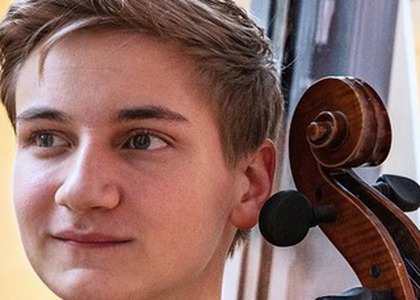> Interviews

Interview with cellist Jan Sekaci
On Tuesday, June 10th, 2025, the Radio Hall in Bucharest will host a new event within the "Heirs of Musical Romania" series. On stage will be cellist Jan Sekaci, winner of the "Heirs of Musical Romania" scholarship - 2024 edition and pianist Daria Tudor, a singer appreciated both in the country and internationally. Jan Sekaci gives us more details about his artistic journey and about the recital at the Radio Hall, in the first part of a dialogue with Ioana Țintea.
Jan Sekaci, you started studying the cello at the age of 10, and your educational journey took you from Oradea to Cluj-Napoca, then to Bucharest, and now you are a student at the prestigious Barenboim-Said Academy in Berlin. How did you feel on this musical training journey?
I look at this path of education, there are many years behind, more precisely 14. It was with many ups, many downs, many fabulous experiences, reaching many masterclasses in the world, Paris, in Berlin, in Italy, Montepulciano. Throughout this journey, the most important elements were the man and the people I met, especially cello teachers and not only, and masters of classical music from all instruments.
Tell us about the mentors who have had the greatest impact on your musical journey so far.
For five years I have been studying with Frans Helmerson and he is the first teacher I think of, the first mentor who has substantially trained me. And when it comes to my cello start, the first two names would be master Marin Cazacu and professor Octavian Lup, with whom I studied on various occasions and they always helped me to open my portions, to go further and further, to reach as high a level as possible.
At just 24 years old you won important prizes such as First Prize at the "Johannes Brahms" competition in Austria in 2021 and more recently at the New Hope Grand Prix in March 2025. How do such competitions influence the development of a young musician's solo career? How important are they?
For me, in particular, their main role is to offer and open paths to more concerts in the future, concerts that are open to a wide audience, an audience that gives me the chance to show my personality in front of everyone. When I think about competitions in terms of preparation, it again gives us the opportunity to appear in front of a distinguished jury and shows us every time a certain mirror of ourselves, of development, in which direction we have gone. The months before the competition are of unimaginable intensity. We know a culture of cellists and cello repertoire.
Last year you were designated a winner of the Heirs of Musical Romania Scholarship, offered by Radio România Muzical and Rotary Club Pipera. What motivated you to participate in this competition and what opportunities opened up for you after winning this scholarship?
As I have mentioned before, I applied three times for this scholarship. The third was to be winning, but until that moment this scholarship did not forget about me. Each time he offered me different opportunities, for example, last year's concert in February with the Radio Chamber Orchestra with Maestro Mandeal. It was an extraordinarily valuable experience. Singing with Master Mandeal at such a young age as a soloist, not only meant something, but the experience itself was amazing.
How do you relate to the idea of being an "heir" of Musical Romania and how important is the "Heirs of Musical Romania" project on your artistic path and the Romanian musical scene?
When I think of the official title of "heir", it gives me maximum responsibility in the future. It pushes me to continue in the same direction, with the same intensity and the same speed, maybe even more accelerated" I think Romania deserves an absolute dedication from me. This dedication means a broad knowledge of music from symphonic, chamber, solo perspectives, not just from the perspective of the cello repertoire and other instruments.
Translated by Darius Baciu,
University of Bucharest, Faculty of Foreign Languages and Literatures, MTTLC, year I
Corrected by Silvia Petrescu














